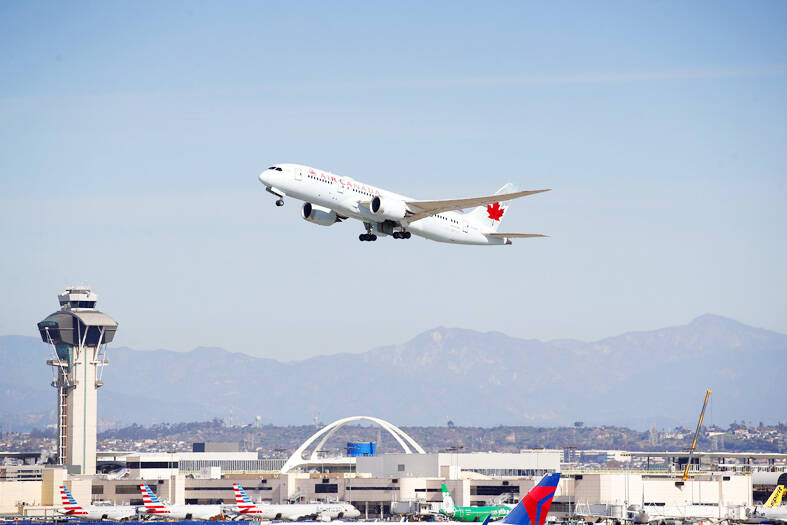Boeing Co is expected to sell nearly 80 787 Dreamliner airplanes to two Saudi Arabian airlines, a source briefed on the matter said on Monday.
An announcement of the plan reported earlier by the Wall Street Journal was expected as early as yesterday, and the list prices for 78 planes was nearly US$37 billion. Airlines typically receive undisclosed discounts when buying airplanes.
State-owned Saudi Arabian Airlines and new national airline Riyadh Air are expected to buy a total of 78 Boeing 787s split between them and have options to buy another 43, the source said.

Photo: EPA-EFE
Saudi Arabian Crown Prince Mohammad bin Salman formally announced on Sunday the creation of Riyadh Air, with industry veteran Tony Douglas as chief executive, as the kingdom moves to compete with regional transport and travel hubs.
Riyadh Air is to serve more than 100 destinations around the world by 2030, making use of the kingdom’s location between Asia, Africa and Europe, the state-run Saudi Press Agency said.
The new airline is expected to add US$20 billion to Saudi Arabia’s non-oil GDP growth and create more than 200,000 jobs, directly and indirectly, it said.
Riyadh Air is wholly owned by Saudi Arabia’s sovereign wealth fund, the Public Investment Fund, which has more than US$600 billion in assets and is spearheading the kingdom’s efforts to diversify its economy and wean itself off oil.
In October last year, Saudi Arabia was in advanced negotiations to order almost 40 A350 jets from Airbus SE, while Boeing was also lobbying for a slice of the kingdom’s transportation expansion, industry sources had said.
The Saudi Arabian deal comes on the heels of a major order in December last year from United Airlines Holdings Inc for 100 787 Dreamliners and 100 737 MAX jets.
Earlier this month, Reuters reported that Indian budget carrier IndiGo Airlines Pvt Ltd was in talks with Boeing and Airbus to purchase more than 500 aircraft, an order that had been expanded to include wide-body planes such as the 787 or Airbus A330neo.
On Friday, the US Federal Aviation Administration announced it would allow Boeing to resume deliveries of the 787 this week that had been temporarily suspended since last month.

Shares in Taiwan closed at a new high yesterday, the first trading day of the new year, as contract chipmaker Taiwan Semiconductor Manufacturing Co (TSMC, 台積電) continued to break records amid an artificial intelligence (AI) boom, dealers said. The TAIEX closed up 386.21 points, or 1.33 percent, at 29,349.81, with turnover totaling NT$648.844 billion (US$20.65 billion). “Judging from a stronger Taiwan dollar against the US dollar, I think foreign institutional investors returned from the holidays and brought funds into the local market,” Concord Securities Co (康和證券) analyst Kerry Huang (黃志祺) said. “Foreign investors just rebuilt their positions with TSMC as their top target,

REVENUE PERFORMANCE: Cloud and network products, and electronic components saw strong increases, while smart consumer electronics and computing products fell Hon Hai Precision Industry Co (鴻海精密) yesterday posted 26.51 percent quarterly growth in revenue for last quarter to NT$2.6 trillion (US$82.44 billion), the strongest on record for the period and above expectations, but the company forecast a slight revenue dip this quarter due to seasonal factors. On an annual basis, revenue last quarter grew 22.07 percent, the company said. Analysts on average estimated about NT$2.4 trillion increase. Hon Hai, which assembles servers for Nvidia Corp and iPhones for Apple Inc, is expanding its capacity in the US, adding artificial intelligence (AI) server production in Wisconsin and Texas, where it operates established campuses. This

H200 CHIPS: A source said that Nvidia has asked the Taiwanese company to begin production of additional chips and work is expected to start in the second quarter Nvidia Corp is scrambling to meet demand for its H200 artificial intelligence (AI) chips from Chinese technology companies and has approached contract manufacturer Taiwan Semiconductor Manufacturing Co (TSMC, 台積電) to ramp up production, sources said. Chinese technology companies have placed orders for more than 2 million H200 chips for this year, while Nvidia holds just 700,000 units in stock, two of the people said. The exact additional volume Nvidia intends to order from TSMC remains unclear, they said. A third source said that Nvidia has asked TSMC to begin production of the additional chips and work is expected to start in the second

US President Donald Trump on Friday blocked US photonics firm HieFo Corp’s US$3 million acquisition of assets in New Jersey-based aerospace and defense specialist Emcore Corp, citing national security and China-related concerns. In an order released by the White House, Trump said HieFo was “controlled by a citizen of the People’s Republic of China” and that its 2024 acquisition of Emcore’s businesses led the US president to believe that it might “take action that threatens to impair the national security of the United States.” The order did not name the person or detail Trump’s concerns. “The Transaction is hereby prohibited,”